The Health Benefits of Metal Detecting Explained

Written by Piotr Lesniewski
Detectorist • Scotland
As an Amazon Associate we earn commission from qualifying purchases. Read our full Affiliate Disclosure.
You’ve probably heard of metal detecting as a hobby for treasure hunters, but have you considered its impressive health benefits? Beyond the thrill of finding coins or artifacts, you’re actually engaging in an activity that strengthens your body, sharpens your mind, and boosts your emotional wellbeing.
It’s a unique form of exercise that doesn’t feel like work, yet delivers surprising physical and mental advantages.
The treasure you unearth might be valuable, but the health benefits you gain are truly priceless.
Key Takeaways
- Metal detecting provides cardiovascular exercise through walking 3-8 miles per session while burning 200-400 calories per hour.
- The activity delivers a full-body workout engaging core, arm, leg, and back muscles through functional movements.
- Metal detecting reduces stress by promoting mindfulness, lowering cortisol levels, and creating a meditative flow state.
- The hobby enhances cognitive function through problem-solving, pattern recognition, and historical research of finds.
- Detecting builds social connections through clubs, family outings, and a shared passion for history and discovery.

Physical Health Benefits
Metal detecting provides excellent cardiovascular exercise as you’ll trek across varying terrains in search of buried treasures. You’ll engage in a full-body workout that improves balance, coordination, flexibility, and mobility while swinging the detector and digging for finds.
The outdoor nature of this hobby also ensures you’re soaking up vitamin D, essential for bone health and immune function.
Cardiovascular Exercise
Four hours of metal detecting provides more cardiovascular benefit than many people realize. As you sweep your detector across fields and beaches, you’re engaging in sustained moderate-intensity activity that significantly improves heart health without the high-impact stress of running or traditional workouts.
During a typical detecting session, you’ll walk between 3-8 miles depending on your location and how long you hunt. This steady movement burns 200-400 calories per hour while maintaining an elevated heart rate in the optimal zone for cardiovascular conditioning.
The natural rhythm of metal detecting creates an effective interval training pattern – periods of regular walking interspersed with more intensive digging when you discover a target. This variation maximizes the cardiovascular benefits while keeping the activity enjoyable and sustainable.
Full-Body Workout
Beyond its cardiovascular benefits, metal detecting serves as a surprisingly complete full-body workout. While you’re searching for buried treasures, your core muscles engage continuously as you swing the detector and maintain proper posture throughout your hunt.
Your arms and shoulders work consistently as you operate the detector and dig when you’ve located potential finds. Each time you squat to investigate a signal, your leg muscles activate in functional movements that mimic gym exercises.
The back muscles strengthen as you bend to retrieve targets and carry your equipment across varying terrains. Unlike repetitive gym routines, metal detecting engages multiple muscle groups simultaneously in natural, functional movements. This comprehensive workout happens almost unconsciously as you’re focused on the excitement of discovery rather than the exercise itself.
Improved Balance and Coordination
While searching for buried relics and coins, metal detecting enthusiasts naturally develop enhanced balance and coordination skills that benefit their overall physical health. As you traverse uneven ground—hiking across beaches, forests, and fields—your body constantly adjusts to changing terrain, significantly improving your proprioception (your body’s awareness of its position in space).
You’ll notice improvements in hand-eye coordination as you operate detector controls while walking, requiring you to simultaneously manage the device’s signals, watch where you’re stepping, and maintain proper sweeping technique. This multitasking—listening for audio cues, scanning the environment visually, and maintaining balance—trains your brain to coordinate multiple motor functions efficiently. Over time, these skills transfer to everyday activities, potentially reducing fall risk and enhancing your ability to perform complex physical tasks.
Flexibility and Mobility
The physical demands of metal detecting naturally enhance your body’s flexibility and mobility with each expedition. As you repeatedly bend and squat to investigate potential finds, you’re performing movements that maintain crucial joint flexibility throughout your body. These motions mirror exercises physical therapists often recommend for maintaining functional movement.
Walking across varied terrain—whether beaches, fields, or wooded areas—challenges your ankle and knee mobility in ways that flat, urban surfaces never could. Your body adapts to uneven ground, strengthening stabilizing muscles and improving joint range of motion.
Meanwhile, you’re constantly handling equipment and manipulating small objects, which enhances your grip strength and dexterity. The precision required to recover delicate items promotes fine motor control that benefits everyday tasks. You’ll notice these improvements extending into your daily activities.
Vitamin D Production
Sunlight becomes your natural pharmacy during metal detecting sessions. As you sweep your detector across open fields and beaches, your skin is busy synthesizing vitamin D, an essential nutrient many people don’t get enough of in their daily lives.
This “sunshine vitamin” plays a crucial role in maintaining strong bones by helping your body absorb calcium and phosphorus. It’s also vital for proper immune function, helping you fight off illness and infection. Regular metal detecting expeditions provide consistent vitamin D exposure that can improve your mood and may help prevent seasonal affective disorder.
For those who work indoors or live in less sunny climates, your metal detecting hobby offers a practical way to boost vitamin D levels naturally without supplements, simultaneously nourishing your body while you pursue your passion.
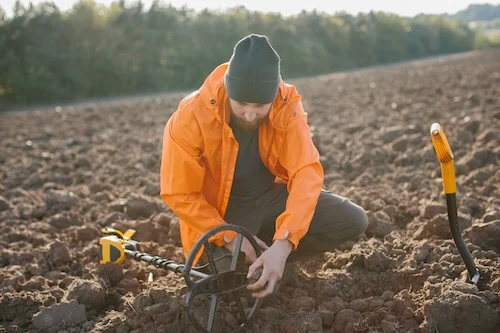
Mental Health Benefits
When you’re metal detecting, your stress melts away as you focus on the subtle signals from your detector rather than life’s pressures. Your brain stays engaged through constant problem-solving, from interpreting signals to researching discoveries, while each find delivers a rush of accomplishment that boosts your mood.
The hobby naturally encourages mindfulness as you’re fully present in the moment, creating a meditative state that calms your mind while connecting you with both history and nature.
Stress Reduction
Have you ever noticed how life’s worries seem to fade away when you’re fully absorbed in an enjoyable activity? Metal detecting offers precisely this kind of therapeutic escape. When you’re scanning the ground, your mind focuses entirely on the task, silencing anxious thoughts and breaking the cycle of worry.
The natural environment where you’ll conduct your treasure hunting significantly lowers your cortisol levels—the body’s primary stress hormone. Meanwhile, the walking and digging involved release endorphins, your brain’s natural mood elevators.
Perhaps most valuable in today’s hyper-connected world is the digital detox metal detecting provides. You’ll trade screen time for green time, giving your mind a much-needed break from the constant notifications and information overload that contribute to modern stress.
Mental Stimulation
Beyond stress relief, metal detecting offers remarkable cognitive benefits that keep your brain sharp and engaged. Each time you sweep your detector, you’re exercising multiple brain functions simultaneously.
You’ll regularly solve problems as you interpret signals and decide which spots warrant investigation. The hobby naturally trains your pattern recognition skills as you learn to distinguish between different detector responses and understand what they might indicate.
When you research potential hunting grounds, you’re activating memory centers and engaging in historical learning that broadens your knowledge base. Additionally, you’ll develop enhanced spatial awareness as you plan methodical search patterns and map your findings.
Unlike passive entertainment, metal detecting demands active mental participation, providing a comprehensive cognitive workout that combines analytical thinking with practical application in the field.
Sense of Achievement
The thrill of discovery creates powerful psychological rewards that extend well beyond the monetary value of any find. When you unearth an artifact, your brain releases dopamine, delivering an immediate natural high that reinforces your hobby’s intrinsic value.
Each successful hunt builds your confidence and self-esteem. You’ll notice yourself setting increasingly challenging goals and experiencing genuine satisfaction when achieving them. As you develop specialized skills in research, identification, and preservation, you’ll enjoy a tangible sense of progression and mastery.
By recording your finds with local archaeological schemes, you’re preserving history that might otherwise remain buried forever. This provides meaningful purpose to your hobby—turning a simple leisure activity into something with lasting cultural significance.
Mindfulness and Meditation
While unearthing treasures brings achievement, metal detecting offers profound mental health benefits through its meditative qualities. The repetitive sweep of your detector creates a rhythmic pattern that naturally calms your mind, similar to the effects of formal meditation practices.
You’ll find yourself fully present in the moment as you focus on subtle audio signals and ground conditions. This present-moment awareness pulls you away from daily worries and into a flow state where time seems to disappear. Many detectorists report entering a trance-like concentration that refreshes their mental energy.
The activity also connects you directly with nature, allowing your mind to recover from the mental fatigue of modern life. Whether detecting on beaches, in forests, or fields, you’re engaging with the environment in a mindful way that promotes psychological well-being.
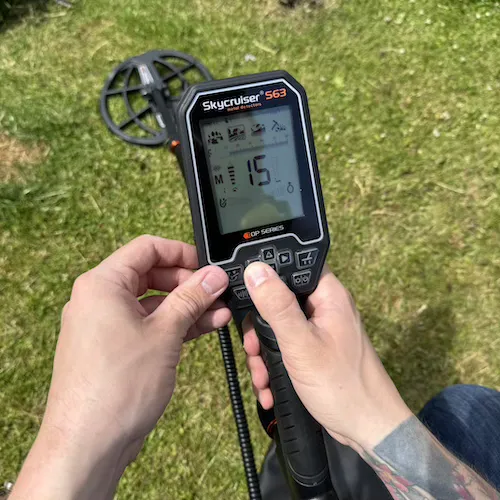
Social and Emotional Benefits
Metal detecting connects you to a vibrant community of enthusiasts who share tips, stories, and excitement over discoveries.
You’ll feel a profound connection to history as you unearth artifacts that link present to past.
The hobby creates lasting family bonds through shared adventures and the thrill of discovery together.
Community Connection
Friendship flourishes when people share a common passion, and metal detecting creates perfect opportunities for meaningful social connections. You’ll find local clubs in nearly every region where enthusiasts gather to swap stories, share techniques, and celebrate each other’s discoveries.
These communities bridge generational gaps naturally. You might see grandparents teaching grandchildren how to use equipment while teenagers help older members navigate digital mapping tools. This knowledge exchange strengthens bonds across age groups.
When you join a metal detecting community, you’re gaining more than just hobby companions. You’re building a support network of people who understand your excitement over historical finds and share your respect for preservation. The camaraderie extends beyond club meetings into group hunts, online forums, and annual conventions where lifelong friendships are formed through shared adventures.
Historical Connection
Beyond the social bonds formed in detecting clubs lies a deeper connection—one that spans centuries rather than just communities. When you unearth an artifact, you’re creating a tangible link to the past that fosters emotional engagement with history in a way textbooks simply cannot.
Each discovery offers unique storytelling opportunities as you imagine who might’ve held that coin or dropped that button. You’ll find yourself developing a richer appreciation for local heritage and cultural history as you literally uncover it beneath your feet.
Many detectorists report a profound sense of purpose when contributing their finds to archaeological databases. You’re not just collecting items—you’re helping write history, preserving knowledge, and connecting with those who walked the same ground centuries before you.
Family Bonding
The perfect antidote to our increasingly digital lives, metal detecting offers families a unique opportunity to connect in meaningful ways while enjoying the outdoors together. This hobby bridges generational gaps, providing activities suitable for everyone from grandparents to young children regardless of physical abilities.
When you’re searching for treasures together, you’re creating shared adventures that become cherished family memories. Parents and grandparents can teach younger generations about history, geography, and environmental stewardship while modeling patience and persistence.
Best of all, metal detecting pulls everyone away from screens and into nature, fostering genuine conversations and interactions. You’ll work as a team, celebrating each other’s discoveries and building stronger family bonds through shared experiences that simply can’t be replicated through digital entertainment.
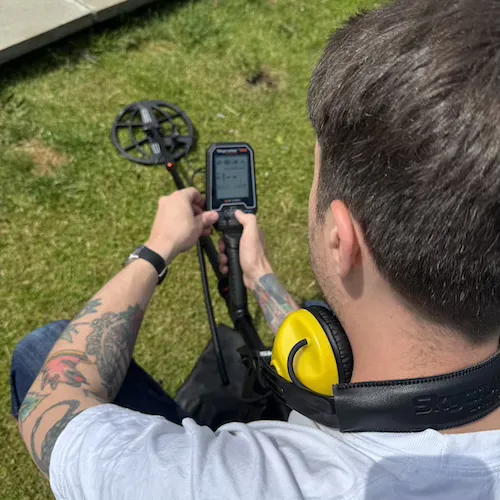
Cognitive Health Benefits
Metal detecting can boost your memory as you recall search patterns and identify artifact types in various locations.
Your executive function improves through planning expeditions, making split-second decisions about signals, and maintaining focus during long searches.
You’ll experience continuous learning and growth while researching historical contexts of your finds, mastering equipment technology, and developing pattern recognition skills that transfer to other areas of life.
Memory Enhancement
While engaging in the hunt for buried treasures, you’re simultaneously exercising crucial cognitive functions that enhance memory retention. Your brain catalogs productive hunting grounds and permission areas, creating a detailed mental map that strengthens spatial memory.
You’ll notice improved retention of technical knowledge as you learn to operate different detectors and interpret various signals. Each distinctive tone and pattern becomes encoded in your memory, helping you distinguish between valuable finds and common debris.
The historical research accompanying the hobby further enhances your factual memory. As you uncover artifacts, you’ll connect them with historical contexts, dates, and significance—creating rich mental associations that reinforce learning.
This continuous memory exercise, from remembering successful techniques to recalling productive locations, provides valuable cognitive training that extends beyond the hobby itself.
Executive Function
Beyond memory benefits, metal detecting significantly enhances your executive function—the set of mental processes responsible for planning, problem-solving, and self-regulation. Each expedition requires you to plan thoroughly, researching potential locations, securing permissions, and organizing your equipment.
You’ll constantly exercise decision-making skills when identifying promising targets and determining whether a signal warrants digging. These choices demand quick analysis and judgment, strengthening your cognitive flexibility.
The hobby also forces you to manage your time effectively, balancing detecting sessions with other life responsibilities. You’ll learn to allocate resources efficiently—from maintaining your equipment to maximizing your field time.
These executive function improvements extend beyond the hobby itself, potentially enhancing your professional performance and daily task management as you apply these sharpened skills to everyday challenges.
Learning and Growth
As you pursue metal detecting, your brain constantly absorbs new information, creating a rich environment for cognitive growth. You’ll develop specialized research skills as you investigate potential sites through historical maps, land records, and local histories.
This continuous education expands your knowledge of history, technological developments, and detection techniques.
You’ll gain technical expertise about electronics, how detectors function, and the properties of various metals. The hobby requires understanding archaeological principles too—recognizing historically significant items and following proper reporting procedures for important finds.
This ongoing learning process isn’t just about becoming a better detectorist; it’s actively strengthening neural pathways and building cognitive reserve. The combination of technical knowledge, historical research, and field experience creates a powerful formula for maintaining mental acuity throughout your life.
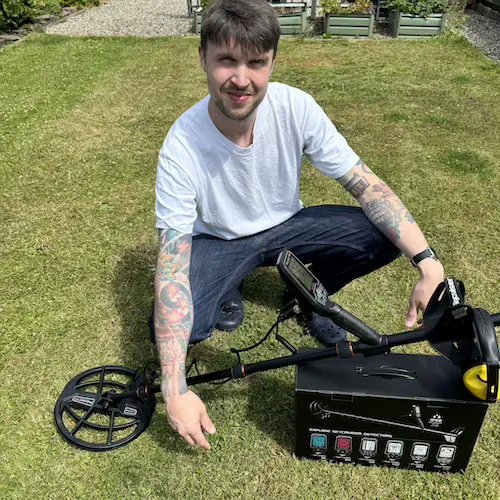
Therapeutic Applications
Metal detecting has emerged as a valuable therapeutic tool for physical rehabilitation by improving mobility, coordination, and strength in a low-impact, engaging way.
You’ll find mental health professionals now recommending this hobby to reduce anxiety, depression, and PTSD symptoms through its mindful nature and reward system.
For older adults, regular detecting sessions contribute to increased longevity through consistent physical activity, social engagement, and the cognitive stimulation that comes from learning about historical finds.
Physical Rehabilitation
While patients recover from injuries or illness, metal detecting offers an effective therapeutic option with remarkable physical benefits. You’ll find it’s an ideal low-impact exercise that doesn’t strain healing tissues while still engaging multiple muscle groups.
If you’re rebuilding fitness after being sidelined, metal detecting allows you to increase activity levels gradually at your own pace. The weight of the detector and the reaching motions help rebuild strength naturally, while the precision required improves fine motor skills that may have diminished during recovery.
Walking on varied terrain while detecting also provides excellent balance training. You’ll navigate uneven ground, slopes, and different surfaces that challenge your proprioception and stability without high-impact stress. This combination of gentle movement and skill development makes metal detecting uniquely valuable in physical rehabilitation programs.
Mental Health Support
Beyond physical rehabilitation, the therapeutic applications of metal detecting extend into the realm of mental health with powerful benefits. When you’re struggling with depression, the combination of outdoor activity and the achievement of finding treasures can lift your mood and provide meaningful goals.
For anxiety sufferers, the mindful focus required and immersion in natural settings creates a calming effect that reduces stress responses.
Those managing PTSD find metal detecting offers grounding activities and a predictable routine that creates safety and stability. For individuals in addiction recovery, this hobby presents a healthy alternative that engages your mind and body while creating distance from triggering environments.
The structured yet exploratory nature of the activity balances achievement with relaxation, making it an increasingly recognized therapeutic tool for various mental health challenges.
Aging and Longevity
As we age, maintaining cognitive function becomes increasingly vital, and metal detecting offers a comprehensive approach to longevity. This hobby engages your brain in multiple ways—from researching historical sites to interpreting detector signals and identifying finds—creating a continuous mental workout that helps preserve cognitive abilities.
You’ll benefit physically through the walking and digging involved, providing low-impact exercise that maintains mobility and strength. The social aspects of metal detecting, whether joining clubs or sharing discoveries online, prevent the isolation that often accompanies aging.
Perhaps most importantly, metal detecting provides purpose and meaning in retirement years. The excitement of each potential find creates anticipation and goal-oriented thinking, while connecting you to history gives perspective on your place in time’s continuum—all contributing to a fulfilling, active longevity.

Environmental Health Benefits
You’ll benefit from regular exposure to fresh air and natural environments while engaging in your metal detecting hobby.
Spending time outdoors connects you directly with nature through the practice of grounding or earthing, where your body makes physical contact with the earth’s surface. This physical connection with soil can potentially reduce inflammation and improve your overall mood through natural electrical charges from the earth.
Fresh Air and Nature Exposure
While many hobbies keep you indoors, metal detecting immerses you in the natural world with significant environmental health benefits. You’ll breathe cleaner air compared to confined indoor spaces, which can reduce respiratory issues and improve your overall lung function.
The natural sunlight you’ll experience regulates your circadian rhythms, improving sleep patterns and energy levels throughout the day. As you hunt for treasures across different seasons, you’re exposed to diverse environmental stimuli that naturally engage your senses and boost mental alertness.
Metal detecting connects you with nature’s cycles—experiencing the changing seasons, weather patterns, and natural landscapes. This connection provides a grounding effect that’s difficult to replicate indoors. You’re not just finding artifacts; you’re absorbing the restorative benefits that only nature can provide.
Grounding and Earthing
This direct earth contact may provide significant physiological advantages. Unlike walking on concrete or pavement, your feet engage with natural, uneven terrain while detecting, promoting better balance and foot mechanics. You’re also exposed to fewer electromagnetic fields than in urban environments, where electronic devices and power lines saturate your surroundings.
Many detectorists report feeling more centered and refreshed after a session in the field. This isn’t just psychological—the physical connection to the earth’s surface during your treasure hunting adventures might be delivering measurable health benefits through electrical conductivity with the soil.
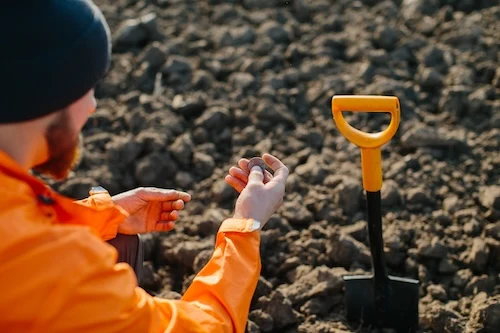
Maximizing Health Benefits of Metal Detecting
To maximize metal detecting’s health benefits, you’ll need to follow safe practices like using proper posture, wearing protective gear, and taking regular breaks.
A balanced approach means you’re mixing up your detecting locations and terrain types while setting reasonable time limits for each session.
You’ll also boost your wellbeing through social integration by joining local detecting clubs, participating in group hunts, and sharing your discoveries with the detecting community.
Safe Practices
Ensuring your safety in the field maximizes the health benefits of metal detecting while preventing injuries that could sideline your hobby. Proper hydration is essential during extended outings—carry water and drink regularly, even when you don’t feel thirsty.
Protect yourself from harmful UV rays by wearing a wide-brimmed hat, lightweight long-sleeved clothing, and applying broad-spectrum sunscreen to exposed skin. Remember to reapply sunscreen every two hours, or more frequently if you’re sweating.
Pay attention to your equipment setup and technique. Adjust your detector’s length to match your height, preventing unnecessary bending. Switch arms occasionally to distribute muscle engagement and reduce strain. Take brief breaks to stretch your shoulders, arms, and back when you’ve been detecting for extended periods.
Balanced Approach
Many successful detectorists embrace a balanced approach to maximize the health benefits of their hobby. You’ll gain more physical advantages by varying your detecting locations based on different terrain challenges. Try beach detecting one weekend, which exercises your calves through sand walking, then switch to woodland areas where navigating around trees engages different muscle groups.
Don’t forget to incorporate strategic rest periods during longer sessions to prevent fatigue and strain. This isn’t laziness—it’s smart detecting that sustains your energy and enthusiasm.
For optimal benefit, combine metal detecting with complementary activities. You might incorporate photography during your hunts or plan routes that include hiking trails. This versatility not only keeps your hobby fresh and engaging but ensures you’re developing a well-rounded fitness routine while pursuing your passion.

Social Integration
Anyone who’s spent time metal detecting knows it needn’t be a solitary pursuit. You can easily transform this hobby into a social activity that strengthens your community connections and expands your support network.
Join local metal detecting clubs to meet enthusiasts who share your passion. These groups often organize group hunts, educational workshops, and social gatherings where you’ll build meaningful relationships while improving your skills.
Don’t miss detecting rallies and events—they’re perfect opportunities to connect with others while enjoying your hobby. Bring family members or friends along on your adventures to share the excitement of discovery.
Online communities offer another way to integrate socially. Share your finds, techniques, and stories through forums and social media groups where you’ll find encouragement, advice, and camaraderie from detectorists worldwide.
Long-term Health Impact of Metal Detecting
The cumulative effects of metal detecting extend far beyond the thrill of each individual find. When you engage in this hobby consistently over years, you’re building a foundation for better health in multiple dimensions.
Your cardiovascular system benefits from the regular walking and digging, effectively turning treasure hunting into a sustainable exercise routine. You’ll likely experience improved mental wellness as the stress-relieving aspects of outdoor activity compound over time. Your brain stays sharper too—the constant research, target identification, and historical learning creates cognitive reserves that may protect against age-related decline.
Perhaps most significantly, you’re crafting a lifestyle that integrates physical activity, mental stimulation, and social connection—three pillars of healthy aging.
The satisfaction you derive from this meaningful pursuit contributes to a more fulfilled, balanced life long-term.
Conclusion
You’ll find metal detecting offers a comprehensive health package for your body, mind, and social well-being. It’s not just a hobby—it’s a lifestyle that strengthens your muscles, sharpens your cognition, reduces your stress, and connects you with others. Whether you’re seeking physical fitness, mental clarity, or meaningful relationships, you’ll discover these benefits with every swing of your detector.
Author Profile

Piotr Lesniewski
"Digging up the past, one signal at a time."
Polish-born, Scotland-based, and obsessed with the beep. My passion began decades ago, exploring fields with my Dziadek (grandfather). Now, with over 10 years of digging under my belt, I'm here to share everything I've learned—unfiltered and unbiased—to help you unearth your own piece of history. No sales pitches, just real field experience.